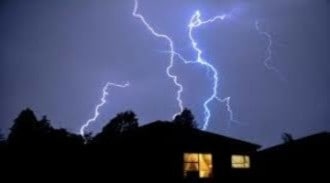
Each rainy season, many people lose some of their expensive electronic equipment due to power surges. This can easily be minimized if you can implement some of the steps I explain below. It is a perfect D.I.Y. project for any home owner.
- Firstly you need to be aware of the possible dangers and when they are likely to occur.
- Know there is a lot in your power that you can do, to avoid surge damage.
- Knowledge about the subject will give you the confidence to put the right steps in place.
- Various surge protectors can easily be bought and installed yourself to give you peace of mind when thunders storms get closer.
- Being prepared for power surges will not only save you a lot of money and hassles when an incidence occurs, it will give you peace of mind that if you happen not to be home, your electronics will be safe when you see clouds appear.
** Following here are the things that I have learned that we all can do ourselves in simple steps to turn power surges into a non issue. The best part of it is that you do not have to do it all at once. Look at your budget and do the most urgent and then as you can afford, the rest can follow in months to come. Once you are done, you will be protected for many years. * Doing this project is very simple and something that anyone can do.
1. What is meant by power surges that can effect your home appliances?
Surges originate only in a few ways:
- If you happen to have large electrical devices that draws a lot of current, like large air-conditioners, they can cause a surge at the moment that they are switched off.
- Then “Load shedding” by your utility provider can create a surge at the moment power is returned, that can be devastating to electronics. The electricity does not come back on gradually, but at full force and we just have to find a way to absorb this surge before it reaches our equipment.
- Until you have surge protection, it is a good habit to switch off your main power switch during load-shedding, and only put it back on, after the neighborhoods power has been restored.
- The most severe one of course is lightning, that is the most unpredictable and catches many of us off guard. When this static charge of electricity happens to enter or reach our internal electrical cable system, the spike in power is too much for the components design, and damage results.
2. What is lightning and how does it affect my DStv & electronic equipment?
- Some lightning takes place internally within a cloud not effecting us, besides that it warns us of it’s impending bigger brother.
- The lightning that takes place from one cloud to another does not hold much danger for us either.
- It is the lightning that travels from the cloud to the ground that we have to seriously try to avoid getting into our devices.
3. How does lightning really behave?
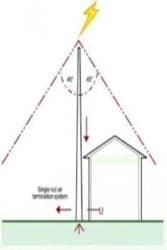
- In layman’s terms, lightning develops because of friction between the molecules of air and moisture inside of cloud formations. This build up of energy seems to have a desire to discharge itself to neutrality at the nearest point of earthing. The lightning bolt is attracted to the spot that has the least resistance to it earthing itself and then releases it’s energy.
- Speaking to the electrical engineers at the SABS (South African Bureau of Standards), I was told that with lightning nothing is for certain and cannot be predicted as accurately as other sciences.
- When lightning struck my house in about 1988, it did not hit the highest part, but the lowest. This confirms my theory that lightning will aim for the area with the least resistance to grounding. Other factors seem to have less of an affect.
- You can also look at the map on the SABS website that shows you the areas that get struck more intensely than others. One will for instance see that there is an area running from Carltonville to Witbank that is in a high density strike area. This is because of the dolomite reef that runs underground all of this area.
- Where you live therefor also has an influence on your likelihood to be affected by this phenomena.
- In 30 years I have only seen 2 to 3 homes that have annually been struck by a direct lightning bolt, where as we do numerous repairs to homes every summer season that has had lighting damage coming in through the electrical system.
- This proves to me that one has only a minute chance of being struck directly and that there is very little we can do to prevent this, besides erecting a tall lightning mast next to one’s home. (Like they do with thatched homes).
- Besides the above, there is very little we can do to prevent a direct strike damaging our equipment, because lightning will just purely jump over any protective devices you put in it’s way.
4. What really happens to DStv parts during a surge?
- Our electronic devices like decoders and televisions are designed to operate on 230Volts with only an allowable variation of about 10%.
- If for only a nano second the voltage should go up by 40%, we will have more that 300 volts entering the machine that is way above its operating specs. This is when damage occurs.
- In most cases it is not a lightning strike or a severe power surge that damages our equipment, but those very small spikes and variations in power that keeps on causing its damage little by little, until a decoder one day decides it has had enough and retires.
- We can not only have peace of mind, but we can extend the life of our electronics substantially by protecting it from surges.
5. Interesting facts about DStv & power surges:
- In the beginning of DStv, they insisted that all LNB’s had to be earthed and we were still losing an extremely high amount of LNB’s every month due to lightning surges. Some accredited installers then started not to earth their LNB’s and it was soon noted that much less LNB’s had to be replaced every summer. DStv took note of this information and discontinued the rule.
- It is understandable that before DStv, terrestrial antennae had to be earthed, because it was mounted on the highest part of the house. (This is done mostly for the protection of the inhabitants.) It also was connected to a television that was earthed inside the house creating a strong attraction for lightning. This means that the lightning force will rather go down the earthing cable to ground, leaving only very little energy finding its way to the television set.
- DStv decoders, televisions and other items are nowadays not earthed at all, greatly diminishing this danger.
6. What can we do to protect our DStv & home appliances?
*There are several areas in a wiring setup where we can build in a buffer against surges:

- We now know that our greatest danger lies where the mains power enters the house. When homes get built the contractor should install a surge arrester on the “Live” as well as the “Neutral” line entering the house. Because it is not always mandatory, this seldomly gets done, which leaves it to the home owner to install, who usually is unaware of the situation.
- Installing these units is a very simple process, but if you feel uncomfortable, rather hire an electrician to do this. These units are also not very expensive and will now protect every device in the house.
- It might be a good exercise to walk through the house and make a list of all the devices that you own and decide which ones will be worth protecting first. I am here just going to concentrate on the protection of your Tv and DStv devices.
- We want to achieve two objectives: 1) Trap and divert any surges. 2) Regulate the voltage to remain as close as possible to the 220-230 volt range. Remember that if the power voltage becomes too low, it is also not good for a device. A voltage regulator is therefor ideal.
- There are protectors available that can either do the one or the other, but the ideal is to get one device for both. These units are usually based an a plug & play concept. The more serious voltage regulators are a bit bulky, but the ones in the form of a multi-plug is small enough to hide behind the TV cabinet.
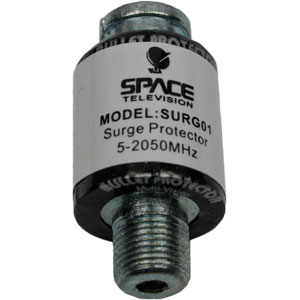
- I remind you that your LNB is powered from your decoder, and should be much safer once each decoder has protection connected to it. There are in-line LNB protectors available that can be connected where the LNB cable connects to your decoder, for extra peace of mind.
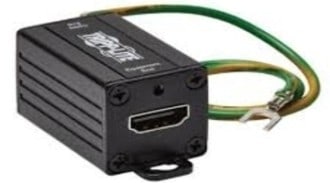
- HDMI cables and connectors are highly vulnerable to surges, but there are plug in devises available to protect them with.
7. Budget solutions to help until one can afford the professional lightning protectors for our home:

- In the years before all the pro-equipment came on the market, I installed many ordinary computer UPS’s for customers to help with this problem, with remarkable results.
- A UPS has a very unique feature, whereby as soon as the power goes off, a spring loaded relay switches the power source onto its battery. This stays that way until the power comes back on. Only then does the relay switch back to the external utility power, avoiding the normal surge totally.
- The smaller UPS models also nowadays have a minor level of voltage regulation, but the larger models of 2000VA and more, have excellent voltage regulation, where it will take power from its battery to increase any temporary low voltage condition.
- An additional benefit is that you can watch DStv for quite some time during load-shedding, running off it’s battery.
8. How to protect the expensive Multi-switches in a communal DStv or Satellite system:
As mentioned, lightning surges usually enters the electrical system from anywhere on the grid in your area. There is nothing stopping it on the way to your house or unit in a complex. It is the home owners or Corporate Bodies responsibility to install any protection. Below I show a diagram of how this can be done.
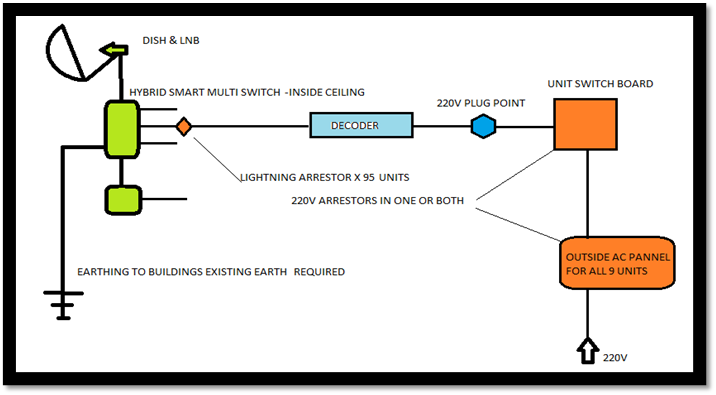
- The first and most important place to stop a surge is at the UNIT SWITCH BOARD. If you install a high quality arrestor here on both the Live and Neutral cable, you have gone a long way. It is best to also add a Sat/RF arrestor at the each cable entry point into each multi-switch.
9. Conclusion:
- My experience is that the insurance companies will scrutinize ones claim after a lightning incident and ask what we have put in place to avoid it. Even if they pay out for your damages, you have to go through a lot of drama to have items replaced, as well as being without your luxuries for a while. Is it not better to avoid it altogether if possible?
- We have to be informed shoppers here and buy the best high quality products that we can find. I have noticed that many of the general dealers and chain stores keep products of a quality which most informed people will question.
- Keep in mind that there is no protector that has the ability to protect 100%. It is therefor my advice to always, when you are at home, totally unplug every vulnerable device from the wall socket. This is the only 100% way! Your surge arrestors will give you the peace of mind when you are sitting in a restaurant having a good time, not to be worried if you see some lightning moving towards your house.
I sincerely hope that this information will help you and your home to be “Surge-ready”.
